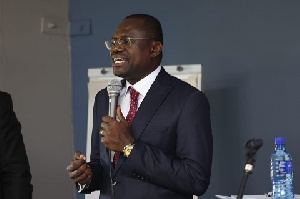It is not uncommon to read or hear many Ghanaians use the expressions, ‘The ordinary Ghanaian’ or ‘The average Ghanaian.’ Most of our technocrats and politicians litter their observations and speeches with these expressions to refer to a certain class of persons whom I consider faceless if not visible ghosts. They more often than not top up these expressions with another complex phrase, ‘On the street.’ So, the expression in full reads thus, ‘The ordinary man on the street’ or ‘The average man on the street.’
Now the confusion in this whole saga as I will put it is the unavailability of any bracket or parameters to measure these ordinary or average Ghanaians so that these mysterious stereotyped persons can easily be identified. Is the average or ordinary Ghanaian the person who hustles on the streets daily to make ends meet and often looked down on by persons who suit themselves with popular fashion brands and ride in expensive SUVs? My critics may assume that the concerns raised here sound or seem overstretched but they must not also lose sight of the fact that those descriptions in my estimation are vague, broad in scope and saddled with countless interpretations.
The purpose for courting attention to this concern stems from the view that if we are able to properly decipher these persons, it will positively help government in its developmental drive in meeting the essential needs of these persons. It is not enough to limit the semantics of ‘ordinary’ or ‘average’ to the pages of dictionaries. There is the need broaden the understanding of these terms to reflect the dynamics of the economic, socio-cultural and mathematical computations of the economy of Ghana.
And how do we achieve this? It all boils down to the conduct of relevant researches by Think-tanks, research departments of universities and above all the Statistical Service of Ghana. It is rather unfortunate that the Statistical Service of Ghana appears to be tied down to the declaration of inflation figures with the inflation basket being its driving force. In a country like Ghana where statistics seem to be scanty and those available are treated with serious doubts and questions, there is little we can achieve in terms of real growth if we are not able to properly identify these calibre of persons living in the country.
One negative effect of this shortfall will be government’s inability to raise enough revenue via taxes because the tax net which is somewhat too loose and porous would not be able to capture a lot of persons in the informal sector who form a greater percentage of the Ghanaian economy. And in this regard, will I be right in stating that persons in the informal sector are the ordinary or average person at the centre of discussion here? Or the words, ‘average’ and ‘ordinary’ can also refer to a certain class of persons in the formal sector?
The vagueness of this tag or stereotyping has reached an extent where I do ask myself this question: Is the average or ordinary Ghanaian on the street labelled so due to his or her vocation, financial status, level of education or skills acquired through training? I must say that there are a lot of women in the Makola and Kejetia Markets who are fabulously rich but lack formal education. In this sense, do we call classify them also as ordinary or average?
In the same vein, there are persons who have acquired formal education up to the tertiary level but are financially handicapped by virtue of the terms and conditions of their chosen professions. Within that context, do we say these persons are ordinary or average because they are not financially sound? For example, there are gainfully employed and well educated individuals such as teachers, nurses, bankers among others who do not have the wherewithal to flaunt their wealth in terms of the purchase of luxurious cars and houses. Do we say they are ordinary or average Ghanaians because they do not swim in wealth despite their knowledge? This is the bane that must be dealt with.
As I indicated early on, if our statistics, data and research are anything to righteously go by, then, we should by now be avoiding those generalisations as we seem to be engaged in now. It will interest you to know that recently, the BBC’s Great British Class Survey has identified seven social groupings in the UK. What appears clearly over here is that their society has evolved to a stage where they are gradually shifting from the usual upper, middle or working class conservatism and identifying sub groups that are gaining a voice within the economic circles.
Why can’t our economic, social, political and development researchers move beyond the rich-poor traditionalist notion and properly identify the various classes or groups with their unique traits? This, I strongly believe, will in turn inform government on how to properly allocate social amenities and other crucial projects relative to their social and economic needs. Otherwise, we will keep on singing the ordinary, average Ghanaian generalisation tune without us making any effort to find out who these Ghanaians are in toto.
This is not the time for government officials to also dabble in this misnomer but properly know the calibre of persons it is exercising authority over. The sweeping statement of ‘the ordinary or average Ghanaian on the street’ must be properly contextualised and not generalised. Semantically, I find the words, ‘ordinary’ and ‘average’ quite belittling, degrading and annoying whenever they are applied to identify a cross section of Ghanaians. Those words carry meanings such as ‘not very good’, ‘common’ ‘unremarkable’ ‘usual’ and others.
If we can refer to some Ghanaians as ‘common’ and ‘not very good,’ is that not discrimination and negative stereotyping? The earlier we demystified by unravelling those Ghanaians referred to as ‘average’ and ‘ordinary’ the better it will be for the growth and development of Ghana because we have come a long way for some of our own blood brothers and sisters to be crudely christened ‘ordinary’ and ‘average.’
SOURCE: OKOFO-DARTEY SAMUEL
E-MAIL: sodesq2000@yahoo.com
Opinions of Tuesday, 10 September 2013
Columnist: Okofo-Dartey, Samuel














